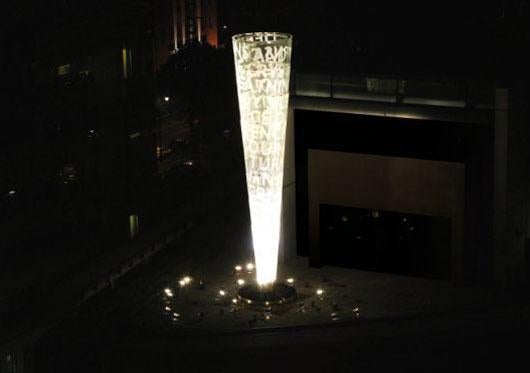
The Secretary-General of the United Nations Ban Ki-moon is to unveil a new memorial aimed at journalists killed doing their job.
The sculpture – called ‘Breathing’is on top of the new wing of BBC Broadcasting House in Portland Place, London, and projects a beam of light one kilometre into the night sky.
The inauguration of the sculpture tonight follows the deaths two weeks ago of two freelance journalists working for the BBC in Afghanistan and Somalia – Abdul Samad Rohani and Nasteh Dahir Faraah.
BBC Chairman Sir Michael Lyons said: ‘We are all reminded of the daily risks taken by journalists in some of the world’s most dangerous places. The implicit contract, whereby journalists place their lives at risk to help us understand the world and its events better, needs to be reaffirmed at moments like this. That sacrifice is properly valued and the loss is widely shared”.
BBC Director-General, Mark Thompson said: ‘We should never forget or underestimate the risks that journalists reporting from hostile environments face. We hope this poignant memorial will serve as a nightly reminder of the sacrifice made by many in the cause of free expression and journalism”.
Eighteen months ago the UN Security Council passed Resolution 1738, which demanded action by member states to end violent attacks on the news media and end impunity for those who kill journalists.
Every night, a light beam, extending one kilometre into the sky, will illuminate the sculpture for 30 minutes, to coincide with the BBC’s 10 o’clock news bulletin.
The memorial comprises a 10-metre-high inverted glass spire designed by artist James Plensa.
Is it inscribed with the words:
life turns and turns on the crystal glass
breathing in our body
silence is a voice, our voice
silence is a body, our body
life turns and turns on the crystal glass
breathing in our body
I invite you to breathe
I invite you to listen to the silence
A poem to accompany the sculpture has been written by James Fenton:
We spoke, we chose to speak of war and strife –
a task a fine ambition sought –
and some might say, who shared our work, our life:
that praise was dearly bought.
Drivers, interpreters, these were our friends.
These we loved. These we were trusted by.
The shocked hand wipes the blood across the lens.
The lens looks to the sky.
Most died by mischance. Some seemed honour-bound
to take the lonely, peerless track
conceiving danger as a testing ground
to which they must go back
till the tongue fell silent and they crossed
beyond the realm of time and fear.
Death waved them through the checkpoint. They were lost.
All have their story here.
Email pged@pressgazette.co.uk to point out mistakes, provide story tips or send in a letter for publication on our "Letters Page" blog
